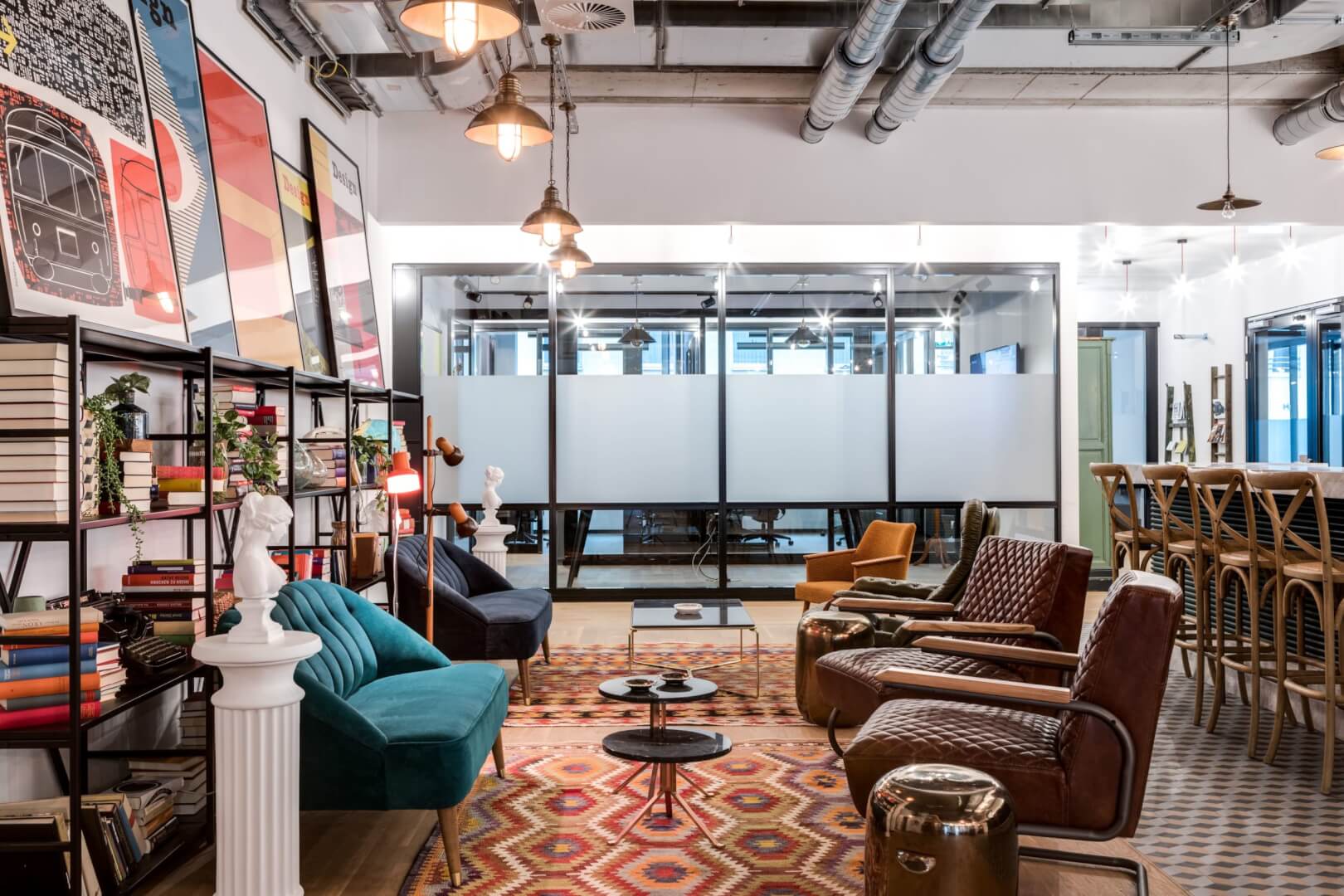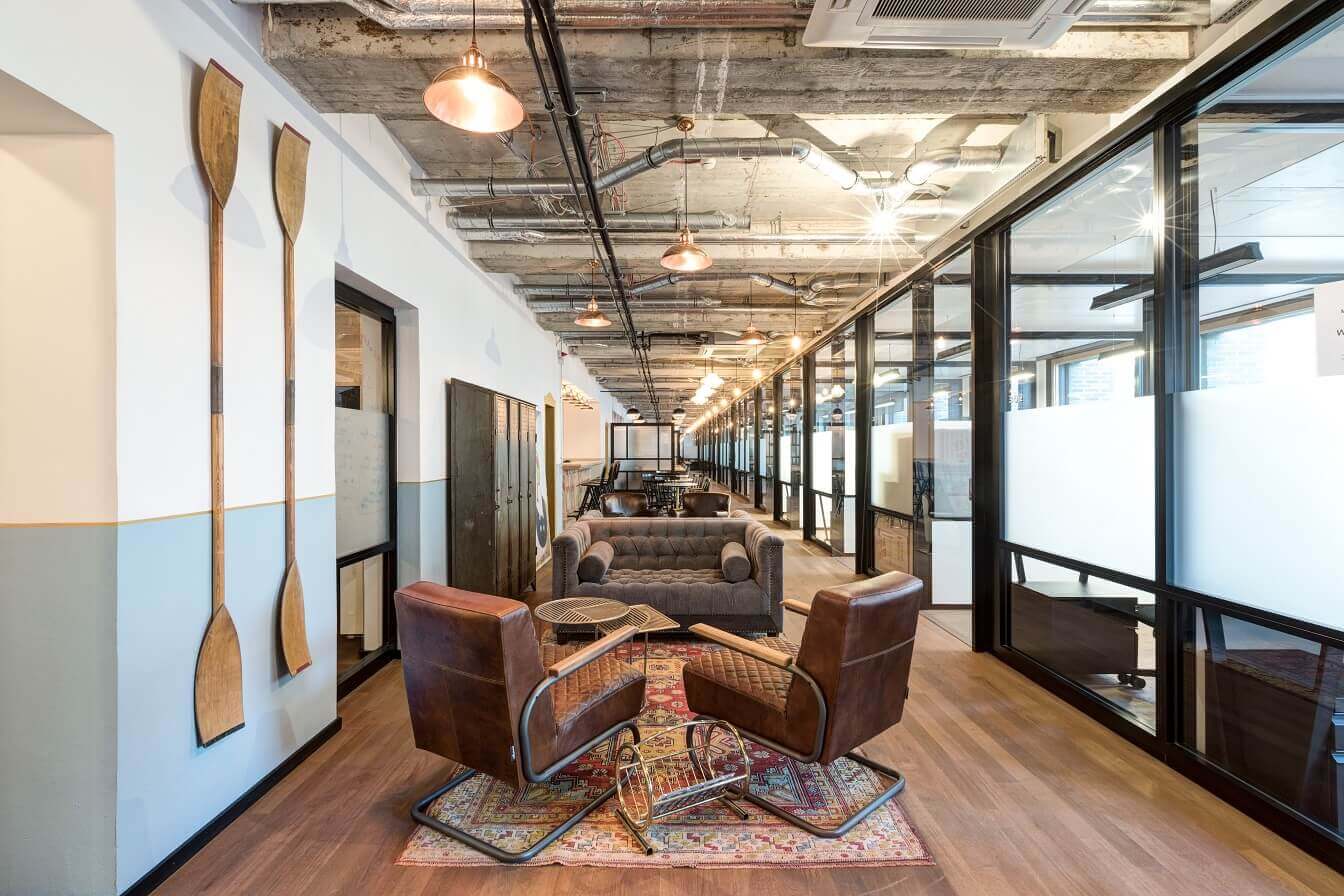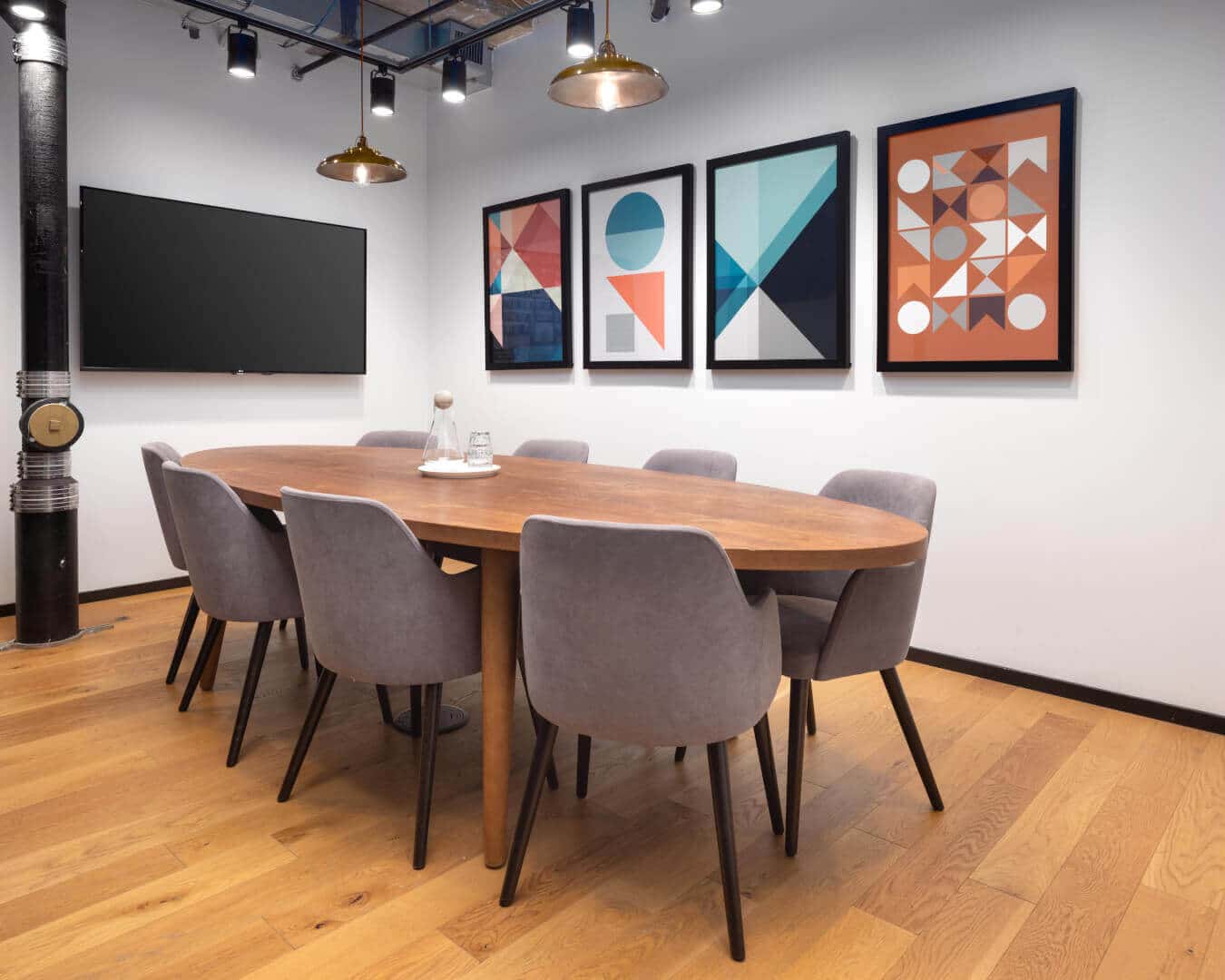
How to Find Small Office Space for Rent
Searching for a small office feels impossible when you’re already juggling clients, staff, and trying to keep your business afloat. If you’re wanting a professional place to meet clients, finding the right space is tough. Location matters big time! Your budget probably feels too tight. And those amenities everyone talks about? They actually do make a difference when you’re spending most of your waking hours there. I’ll share what I learned the hard way about finding office space that works for your specific situation, including some flexible options that won’t lock you into something your business will regret six months from now.
Understanding Your Office Space Needs
Determining Your Space Requirements
First things first – how many people actually need desks? I’ve heard all sorts of rules about square footage per person, usually somewhere between 70-150 square feet each. But reality check: it depends on what you do. Tech companies can get away with tighter spaces, maybe 70-100 square feet per person in those open office setups (though we all know how fun those are during flu season). If you’re in professional services like law or accounting, you’ll need more like 100-150 square feet per person since clients expect a certain privacy level during meetings.
What about your actual workday? Do you need conference rooms where people can spread out materials? Phone booths so sales calls don’t disturb everyone? A decent reception area so clients aren’t awkwardly standing around? Trust me, mapping out a typical day helps tremendously. Where do people gather? What spaces get used most?
Don’t forget about growth plans either. Getting space for exactly seven would have been a nightmare six months later. Sometimes renting slightly bigger than your current needs saves money compared to breaking a lease and moving again before the ink is dry.
This is why those flexible office solutions look so tempting, especially when you’re not totally sure what your team will look like this time next year.
Setting a Realistic Budget
Rent will eat up a huge chunk of your operational expenses, so get real about your numbers before falling for fancy lobbies and cappuccino machines. Most small businesses spend around 5-15% of revenue on workspace, though this varies dramatically depending on your city and industry.
Your budget needs to include way more than just the monthly rent check. Don’t forget:
Utilities (power, water, internet, phones) that can add hundreds monthly Security deposits that lock up cash (typically 1-3 months’ rent) Insurance costs (landlords often require specific coverage limits) Any maintenance or CAM fees (common area maintenance) Parking costs (which can be shocking in downtown areas) All the furniture and equipment you’ll need Actual moving expenses (always more than you think)
One trick that saved me: create two separate budgets. One for startup costs (moving, furniture, tech setup, signage) and another for monthly recurring expenses. Gives you a much clearer picture of total commitment versus ongoing burn rate. With Mindspace, for example, you can get a fully furnished office which saves a lot ot of headaches.
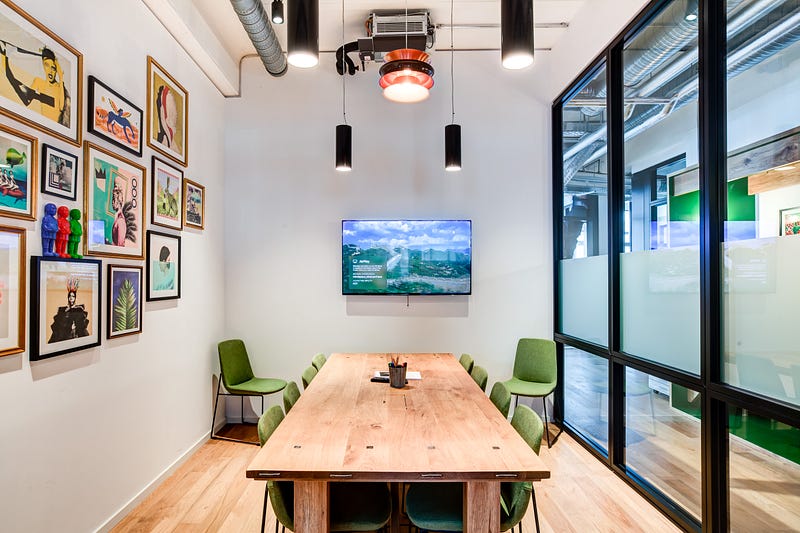
Identifying Must-Have Amenities
Good amenities directly impact how productive your team is and whether your best people stick around. I suggest making two simple lists: absolute must-haves versus nice-to-haves.
For some businesses, these basics were non-negotiable:
Fast, reliable internet (not whatever bargain service the building offers) Meeting rooms you can actually reserve when needed (not always fighting for space) A decent kitchen area (at minimum, fridge, microwave, coffee) Reasonable parking situation (preferably free for clients) Good security setup (especially since we sometimes work evenings) Proper accessibility features Climate control that actually works in all seasons. (Luckily, this and more can be found at Mindspace)
The extras that can be negotiable:
Food options nearby for breakfast or lunch (crucial for lunch meetings) Small fitness area (or at least shower for bike commuters) Some outdoor space for breaks Package handling (as we receive lots of deliveries) Reception services for visitors Print/copy capabilities for those occasional large jobs Some event space options for client presentations.
Workspace providers like Mindspace pack most essentials into their offerings. Makes life simpler since you’re not juggling separate vendors and bills for every little thing each month. If you’re curious about their amenities and what’s included, you can check out these options here and book a tour.
Types of Small Office Spaces to Consider
The commercial real estate world offers several completely different approaches to office space. Each has upsides and downsides depending on your specific situation.
Traditional Office Leases
The classic office lease still dominates but comes with serious considerations for smaller businesses. Most landlords want long commitments (3-5 years minimum), large security deposits (sometimes half a year’s rent), and push virtually all building responsibilities onto you as a tenant.
Upside? Total control over your environment. You can brand everything exactly how you want, build out custom configurations, and create a space that perfectly reflects your company identity. It feels established and permanent to clients and partners.
The downside hits small businesses particularly hard though. Beyond the scary upfront costs, you’re locked into a long-term financial commitment regardless of how your business performs. Need to downsize quickly? Too bad. Want to expand? You might be stuck. You’ll handle everything from internet outages to plumbing problems yourself (or hire people to do it). I learned this pain personally during a business downturn when we still had three years left on a lease that suddenly felt enormous.
Coworking Spaces
The explosion of coworking isn’t just trendy- it solves real problems for smaller companies. These shared environments offer ready-to-go workspaces with flexible terms ranging from day passes to monthly memberships to private office suites within community settings.
Their biggest advantage? Immediate occupancy with minimal upfront investment. You get professional meeting spaces when needed, built-in networking opportunities with other businesses, and predictable all-inclusive pricing covering internet, utilities, coffee, and basic services.
For growing teams, coworking spaces really shine. Need another desk next month? Just adjust your membership. Opening in another city? Many providers have multiple locations, letting your team work from consistent environments across different geographies.
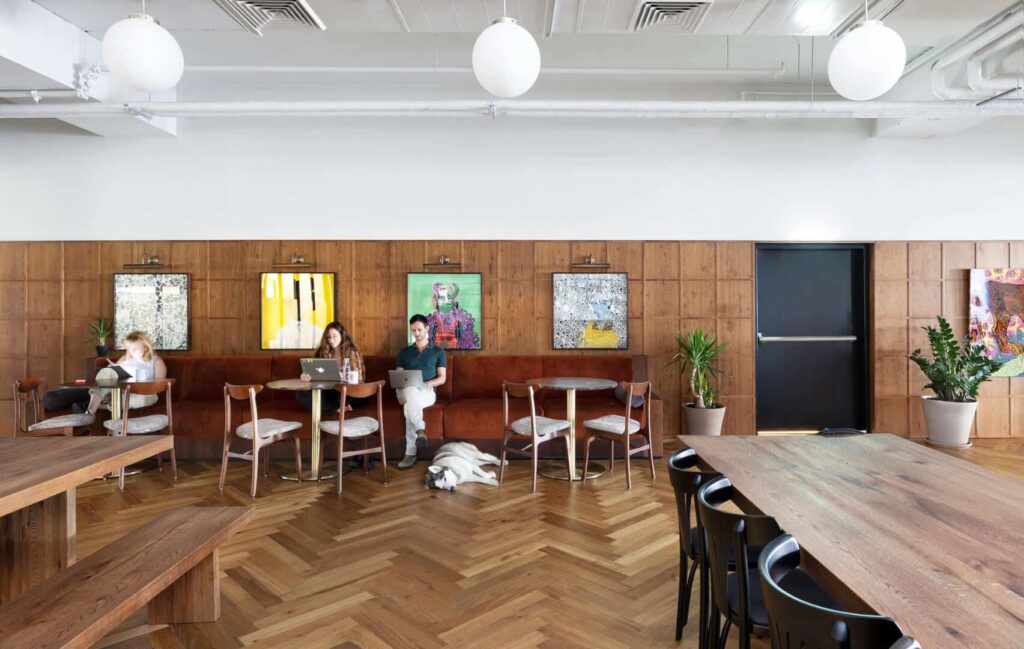
Coworking makes particular sense if cash flow keeps you up at night, your headcount fluctuates seasonally, or you’re testing a new market before committing serious resources. I know several e-commerce brands using coworking as “satellite offices” while they explore neighborhoods for potential retail locations.
Executive Suites and Serviced Offices
These hit a sweet spot between traditional leases and coworking environments by offering private, fully-furnished office units inside professionally managed facilities.
Everything comes ready for day-one productivity: furniture, phone systems, internet connections. Instead of coordinating janitors, maintenance staff, and internet providers yourself, the operator handles everything for one monthly fee.
Lease commitments typically run 6-24 months, offering more stability than month-to-month arrangements but far less commitment than traditional multi-year leases. You maintain privacy and your own branded space while still accessing shared benefits like conference facilities, kitchen areas, and sometimes reception services.
Mindspace offers this type of setup with particularly nice environments. Our approach works well for small businesses wanting the professional appearance of established space without tying up capital in long-term leases or furniture purchases. Book a tour now in your nearest workspace!
Virtual Offices and Hybrid Solutions
Not every business needs physical space five days a week. Virtual office services provide professional business addresses, mail handling, phone answering, and occasional access to conference rooms without a dedicated everyday workspace. Read more about virtual offices here
Hybrid approaches gained huge popularity recently. You get a professional address and physical facilities you can use when needed-perfect for teams working remotely most days but requiring in-person collaboration sometimes.
These setups minimize overhead while maintaining professional appearances. They work particularly well for consultants, freelancers, or businesses with mostly remote teams who need physical space for client meetings or quarterly planning sessions. Mindspace offers excellent virtual office solutions if you need a professional business address without full-time physical space – you can explore our virtual office option.

How to Search for Small Office Space Effectively
Once you know what you need, finding it requires strategy. I’ve refined my approach through several office moves.
Online Resources and Platforms
The internet offers tons of tools specifically for hunting commercial space. Workspace providers like Mindspace showcase available options, amenities, and pricing across global locations on their websites. Their filtering tools help narrow by location, team size, and specific requirements.
Look beyond the basics when reviewing online listings. Check proximity to transit, nearby amenities, and really study photos or virtual tours. Starting online helps establish realistic expectations about what your budget actually gets you in different neighborhoods before physically touring spaces.
Working with Commercial Real Estate Agents
Commercial agents bring market knowledge that can save tremendous time, especially for navigating traditional leases. They understand neighborhood trends, typical terms, and often know about spaces before they’re publicly listed.
Finding the right agent matters though. Look for someone experienced with your target neighborhoods and businesses similar to yours. Good agents ask thoughtful questions about your operations and growth plans instead of just rushing to show properties.
Since landlords typically pay agent commissions, you get their expertise without direct cost to you. Just remember their incentives align with closing deals, so stay firm about your requirements and budget throughout the process.
Leveraging Your Network and Local Resources
Some of the best spaces never hit public listings. Tell everyone in your network you’re looking for office space. I found our second office through a random conversation at a neighborhood business mixer.
Check with local chambers of commerce, industry groups, and small business development centers, which often track available spaces and upcoming vacancies. These resources provide valuable context about different areas and sometimes identify emerging neighborhoods with better value.
Many cities run economic development programs offering incentives for businesses moving to specific areas. These might include rent subsidies, tax advantages, or other perks that significantly impact your bottom line.
Viewing and Evaluating Spaces
Virtual tours help narrow choices, but nothing replaces standing physically in a potential space. When touring, bring a checklist covering:
- Cell signal strength throughout (don’t discover dead zones after signing!)
- Noise levels at different times (that quiet morning space might sit under a noisy bar)
- Natural light throughout the day
- Building security approaches
- How well heating and cooling work
- Bathroom and kitchen cleanliness
- Elevator waiting times during peak hours
- What kinds of businesses surround you (compatible or problematic?)
Visit during different parts of the day- morning arrival rush, midday operations, evening security situation. Take photos and notes because trust me, after touring five spaces, they all blur together in memory. Feel free to book a tour with Mindspace here
Making the Final Decision: Tips for Negotiation and Setup
Once you’ve found promising options, securing good terms and planning a smooth transition become critical.
Negotiating Favorable Terms
Everything remains negotiable, even in competitive markets. Focus beyond just monthly rates:
- Caps on annual rent increases (crucial in hot markets)
- Improvement allowances for customizing spaces
- Free rent periods during your initial setup
- Options to renew at predetermined rates
- Early termination rights if your situation changes including certain utilities or services in base rent
Flexible workspace providers, like Mindspace, typically offer standardized agreements but might provide discounts for longer commitments or larger teams. Always ask about current promotions or package customization options. I once negotiated two free months on an 18-month commitment simply because I asked what specials they were running.
Understanding the Lease Agreement
Commercial leases contain dense legal language with major financial implications. Pay special attention to:
The difference between usable square footage (what you actually occupy) versus rentable square footage (what you pay for) Who handles various repairs and maintenance Rules about subletting if you need to downsize What happens if you default and how much time you have to fix issues Building access hours and security protocols What signage rights you have
For traditional leases, spending money on legal review saves enormous headaches later. Even with flexible workspace agreements, understand everything about notice periods, security deposit returns, and what might trigger additional fees.
Planning Your Office Move
Coordinate moves carefully to minimize business disruptions. Create backward-planning timelines from move-in day:
Technology setup (getting internet connected early saves tears), updating addresses with clients, vendors, and service providers, Furniture delivery scheduling, Staff communication plan,s Mail forwarding setup, updating all online profiles and website information
Try scheduling moving activities during weekends or evenings when possible. Keep communication flowing with both your current and new building management about timing- they’ve seen everything and often suggest simple solutions to common moving challenges.
Why Consider Mindspace for Your Small Office Needs
Mindspace offers particularly strong advantages for small businesses facing workspace challenges. Their thoughtfully designed environments blend private office options with community areas in prime locations globally. Their all-inclusive pricing prevents surprise costs, while flexible terms mean your workspace can adapt alongside your business needs. The supportive atmosphere lets small teams concentrate on growth instead of facility management headaches.
Ready to explore your options? You can book a tour or reserve your Mindspace workspace today and find the perfect office solution tailored to your specific business requirements.


